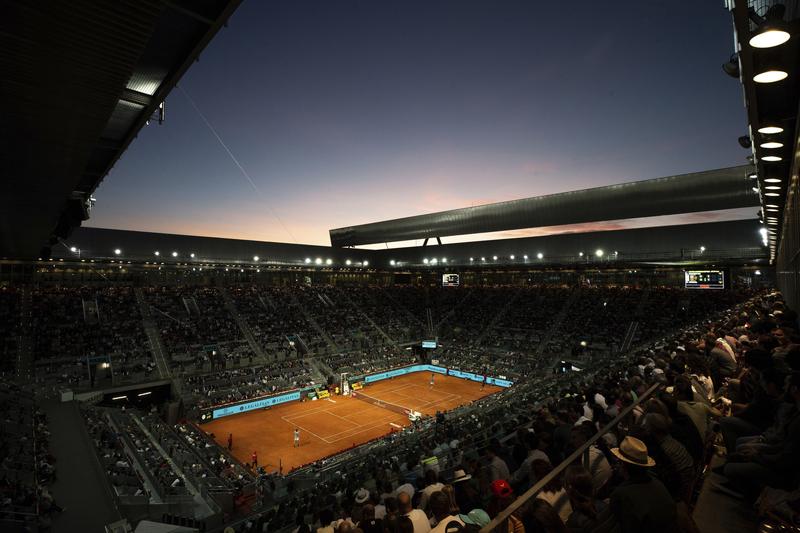 In this May 11, 2019 photo, Rafael Nadal, of Spain, and Stefanos Tsitsipas, of Greece, play the Madrid Open tennis men's semifinal match at the Caja Magica (Magic Box) in Madrid, Spain. (BERNAT ARMANGUE / AP)
In this May 11, 2019 photo, Rafael Nadal, of Spain, and Stefanos Tsitsipas, of Greece, play the Madrid Open tennis men's semifinal match at the Caja Magica (Magic Box) in Madrid, Spain. (BERNAT ARMANGUE / AP)
MUMBAI - Despite the growing possibility of a total wipeout of professional tennis this year due to the coronavirus pandemic, ATP Tour chief Andrea Gaudenzi is refusing to give up on 2020 just yet.
Many people, including 19-times Grand Slam winner Rafa Nadal, have voiced doubts about whether the sport can return in 2020 because players would need to travel around the world to compete in tournaments
The tennis season was suspended in early March due to the COVID-19 outbreak, and the hiatus will continue at least until mid-July with many countries in lockdown to contain the virus.
Wimbledon has been cancelled and the French Open postponed from its usual May start to September, while the status of the US Open, scheduled to take place in late August, is still unclear.
Many people, including 19-times Grand Slam winner Rafa Nadal, have voiced doubts about whether the sport can return in 2020 because players would need to travel around the world to compete in tournaments.
“It would be unwise to call it quits now,” Gaudenzi told Reuters. “Nobody knows what will happen, we want to keep an optimistic overview.
ALSO READ: WTA and ATP postpone all events until July 13
“Obviously, there could be a subset of options, which is playing with closed gates or deciding how to deal with travel restrictions. But we have not made these decisions so far because they are all hypothetical scenarios.”
The Tour is working on a time frame of six to eight weeks to decide on tournaments.
“We have set a deadline of May 15 for the tournaments in July, post Wimbledon,” said the Italian, who reached a career-high singles ranking of 18. “And June 1 for the tournaments in August.
“So we are, in principle, dealing it on I would say six to eight weeks in advance in time for making a decision. Longer than that, it would be foolish to make decisions in my opinion.”
The United States Tennis Association (USTA) is in charge of the US Open, scheduled to run from Aug 31-Sept 13 on the hardcourts of New York.
“Their announcement might be a little bit later, we don’t know,” Gaudenzi said. “Once we get to the beginning of June, we will probably know more about the US summer.”
While professional soccer leagues around Europe are gearing up for a return to action, international travel restrictions make it tougher for tennis to restart.
“You can have an estimate that it’s going to be fairly difficult and unlikely that all these countries will align to one single policy relating to travel restrictions,” Gaudenzi said.
“Australia today for example is probably in a completely different phase than the United Kingdom. You look at Sweden, they have taken a completely different approach. So we could play a tournament in Sweden probably today. But can we travel 100 players to Sweden today? No. So that’s the challenge.”
Great effort
The ATP and the WTA, which runs the women’s circuit, recently joined forces with the International Tennis Federation and the boards of the four Grand Slam tournaments to raise over US$6 million to help lower-level players affected by the shutdown.
Roger Federer recently called for a merger between the governing bodies, and both Gaudenzi and his WTA counterpart Steve Simon welcomed the suggestion.
“It was a great effort,” said Gaudenzi, who took over as ATP chairman in January. “I hope it’s just the beginning of a future productive collaboration which is much needed in our sport if we want to grow and become one of the best.
READ MORE: WTA founder, Federer, Nadal propose to merge ATP, WTA
“I am very pleased with the outcome. I think it’s a great message, very healthy that everybody joined in to help the players who needed the most in this very difficult time.”
Gaudenzi hoped more money would come in for the relief program, which targets about 800 singles and doubles players on the men’s and women’s tours.
“The question is nobody knows how long it will last,” the 46-year-old said. “If we can go back to play fairly soon I think we are going to be okay. But if it lasts for long, it will get difficult because obviously the money will run out.”


